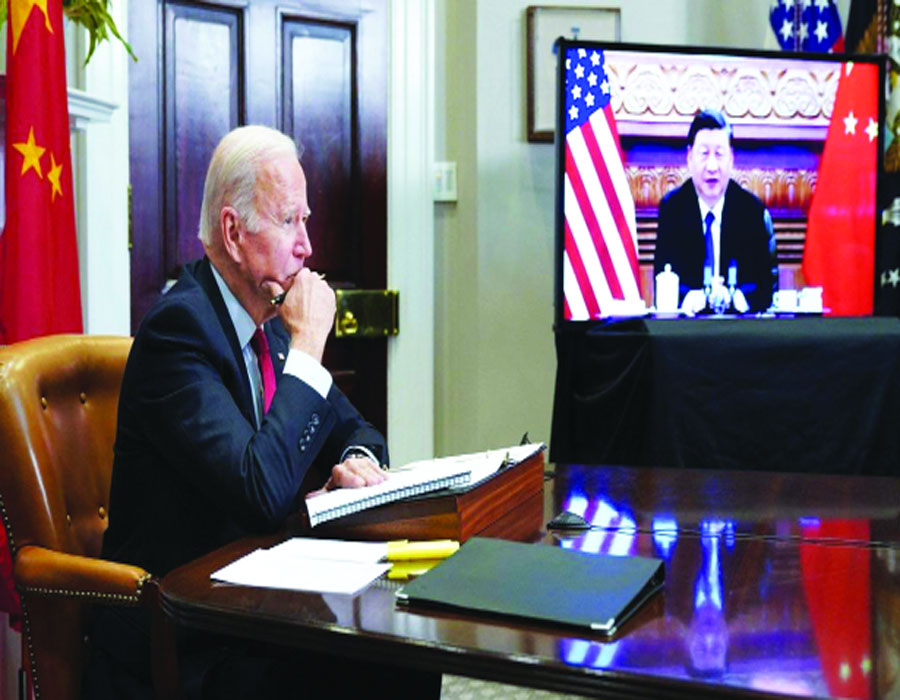At Biden’s ‘Summit for Democracy’, Modi appropriately underlined the point that the democratic spirit is integral to India’s civilisational ethos
It is safe to assume that US President Joe Biden had in mind only electoral democracy when he invited many a head of Government to his December 9 ‘Summit for Democracy’. Prime Minister Narendra Modi made a telling point when he said that the democratic spirit is integral to India’s civilisational ethos. Centuries of colonial rule could not suppress the democratic spirit of Indians. He avoided extending the proposition to a faith in the phenomenon of karma which is nothing, if not democratic, on a metaphysical scale. All humans have a fair and equal opportunity to be automatically rewarded with or denied a bhagya or fate commensurate with her/his karma without a divine entity, say God, having an overriding say in the bhagya. The belief in the operation of karma is like the law in physics that for every action, there is an equal and opposite reaction. This is a faith as near science as yet possible.
Another symptom of Indian democracy is its history down the ages. Anyone who arrived whether via the Hindu Kush or Arabian Sea as the early Jews or other traders, the Parsees, British and many others were welcome, or at least allowed to stay and settle on Indian soil. No one was expelled regardless of being cruel or kind.
The idea behind the open welcome to one and all was that the world was one family, Vasudhaiva kutumbakam. An advantage of this policy — call it Indic — or conduct was that the culture-cum-civilisation became resilient and, regardless of its disinclination to fight, survived against any number and kinds of invasions. Few cultures could withstand it and survive. It began with the advent of the Caliph and his successors, from Arabia, on to Egypt and the Mediterranean countries certainly up to Spain. On the eastern side were Iran, Central Asia, Afghanistan et al but, strictly speaking, not India. If conversions of the indigenous on any scale took place, they were well after the Islamic conquest.
After the Sepoy Mutiny was over in 1858 AD, contact with Britain was reasonably close and frequent. As a result, Indian youth, even women, learnt the British ways of education, culture and socio-politics by the early years of the 20th century. By the time we won Independence, Indian leaders were ready to adopt electoral democracy as the means to choose Governments, at the Centre and in the provinces. We also chose a parliamentary system and not the American presidential style, although it would have been more suitable for India. Every adult was straightaway entitled to vote; those with more education, property or influence could exercise the advantage in their profession but not in an election. This insistence on equality is a hallmark of true electoral democracy. With the passage of every election, the Indian nation has learnt to participate better. There have so far been general elections at the Centre while the States have also been disciplined in holding their polls. The only significant interruption was the Emergency imposed by the Indira Gandhi regime in 1975; it lasted until early 1977. It was unpopular because it was declared only with the intent of saving Indira’s hold on power. Except for those 21 months or so, India’s record of electoral democracy has been commendable.
Even when dealing with Mohammed Ali Jinnah and the Muslim League during Partition, India’s behaviour was, if anything, overdemocratic. In anticipation of the separation, the Qaid-e-Azam and his colleagues were insistent that all Muslims should be facilitated to migrate to the new Islamic country, their homeland. They were at times so vehement as to insist that all Muslims should migrate from India. In his rabid enthusiasm, one of the League bigwigs Sir Firoz Khan Noon thundered in February 1946 in Patna that if the Hindus in India came in the way of the transfer of Muslims to Pakistan, the League would re-enact the orgies of Chengez Khan and Halaqu Khan.
Indian leaders remained calm and implied that Muslims were also their brothers and they should be allowed to decide for themselves. An Exchange of Population plan was proposed and supported by Jinnah whereby Muslims, preferably all of them, would migrate to Pakistan. And reciprocally, all non-Muslims would move to India. Rajendra Prasad, who subsequently became the President of independent India, wrote a book entitled India Divided wherein he suggested that those Muslims who didn’t emigrate could stay in India as aliens with visas issued by the Government of India. The same could be done by Pakistan to the non-Muslims who remained behind in that country.
Jinnah promptly agreed with Prasad. Yet, the other Congress leaders kept quiet. In the end, Pakistan, with the help of violence, loot and killing chased out most Hindus whereas Muslims were allowed to stay back in India if they wished. Some went away from East Punjab (India), UP and Bihar but compared to Pakistan, India did practically little. This is true to this day, 75 years later.
This was the practical essence of democracy. It is difficult to think of any other example of such devotion to freedom. India is indeed the land of freedom and, therefore, democracy.
(The writer is a well-known columnist, an author and a former member of the Rajya Sabha. The views expressed are personal.)


























